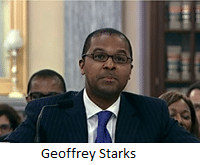
“The dollars are too precious. We need to advance rural broadband as quickly as possible,” said Starks. He called it an “honor to be considered for the seat that was occupied by the barrier-breaking tenure” of former Commissioner Mignon Clyburn — “the first woman to chair the FCC.”
Starks, now an associate Bureau Chief in the Enforcement Bureau, was asked for his views about forming a nationalized 5G network, something the administration floated earlier in the year. “I haven’t seen a fully-baked plan,” said Starks, adding he believes there is a need for network security. “But, what I have seen, I don’t think is a good idea.”
If confirmed, the Kansas City native pledged to protect all of the Universal Service Fund programs that supplement access to broadband for low-income citizens. But he really came alive when speaking about telemedicine. Starks has a twin brother who’s a doctor in South Dakota; his older brother is a doctor in Virginia.
Committee Chairman John Thune (R-SD) asked how programs like USF could be better used to deliver healthcare in rural areas. Starks highlighted tele-trauma, in which patients are remotely assessed to determine if they can go to a local hospital. Those assessments cut down transportation minutes, according to the nominee.
While mentioning he’s working on a bill to streamline broadband deployment on non-federal land, Thune asked Starks for his thoughts. “We’re talking about going from 300k large cell towers to anywhere from 10 to 100 times that number for small cells,” said Starks. That’s why “it’s important to manage our Rights-of-Ways for small cells; it’s important for the FCC to bring stakeholders to the table” for that discussion, he said. “I think there’s a model code that can help localities,” he said, referring to the work that the agency’s Broadband Deployment Advisory Committee is doing. He told Thune he’s “eager” to help him work on the bill; “It’s that important.”
While much of the hearing went smoothly, Thune did impress upon the Democratic nominee, the need to work with his GOP colleagues at the agency, where issues can become “contentious.” Thune continued: “I have long advocated that the hyper-partisanship of the last Commission must come to an end. Mr. Starks, while I understand that not all issues before the FCC can be decided on a bipartisan basis, given the Commission’s role in overseeing regulatory matters that affect our economy and everyday lives, it is important that members of the FCC seek opportunities for common ground and I encourage you to try to do that as often as possible.”
Starks assured committee members he would work with Commission colleagues and build new relationships. He pledged to continue Chairman Ajit Pai’s efforts at transparency.
Rep. Emanuel Cleaver, a Missouri Democrat whose district covers part of Kansas City, introduced Starks at the outset, saying Starks has a passion for justice, and highlighted his commitment to expanding broadband access and closing the digital divide. “I cannot think of any individual more qualified or prepared” to be an FCC Commissioner, he said.
But his comments weren’t all serious. He began by saying Starks “is a diehard Royals and Chiefs fan. As you all should be!”
It’s clear Thune plans to move quickly to get the nomination to the Senate floor for a vote; He asked Committee members to send Starks any follow-up questions by Friday and for the nominee to return answers to the committee by COB Monday.
By Leslie Stimson, Inside Towers Washington Bureau Chief
June 21, 2018




Reader Interactions